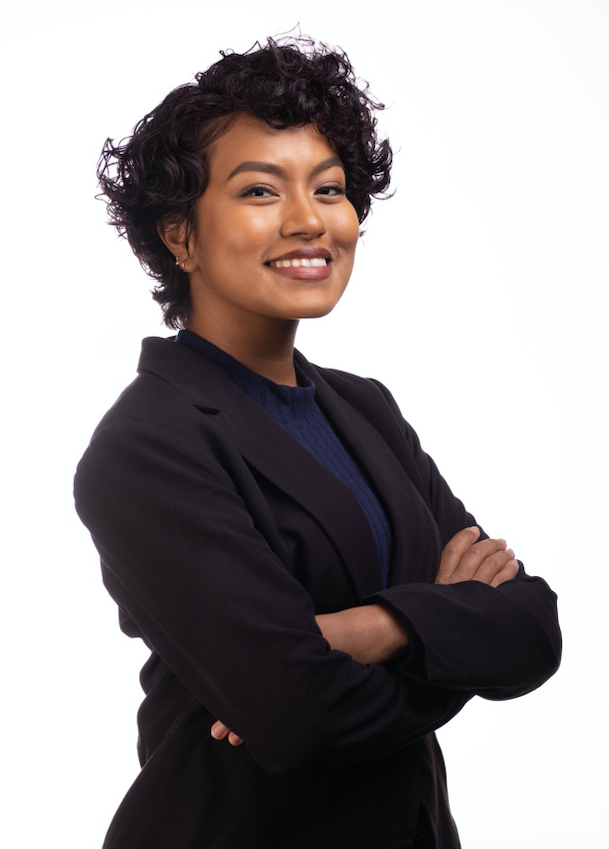This Q&A is part of the story series Voices of Drake that highlights the diversity, ambition, and passion of the incredible people who make up our campus community. This week’s story is designed to celebrate and shine light on Latinx Heritage Month, Sept. 15–Oct. 15. It spotlights Denisse López, senior, double majoring in international relations and sociology, and treasurer of La Fuerza Latina.

Tell us about yourself?
My name is Denisse López and I am a senior at Drake double majoring in International Relations and Sociology with a minor in Politics. I grew up here in Des Moines and graduated from East High School in 2017. My family immigrated here from a southern, coastal state in Mexico known as Guerrero. I am a first-generation American as well as a first-generation college student.
What was your journey to Drake like? How did you decide to come here?
Drake University was in the backdrop of my life for a very long time. My first bus stop for school was on the corner of 22nd and Carpenter, just down the street from campus. It seemed like an easy decision to be able to stay home while getting an education.
What have been some of the highlights of your Drake experience either in the campus community, in the classroom, in the Drake neighborhood, or in the Des Moines area?
My favorite part of being at Drake is being involved with the multicultural student organizations. Even as someone who has been in Des Moines almost my whole life, it was still very hard adjusting to the classroom setting at Drake. Groups like LFL, CBS, ACSA, NAACP, and many others under the Unity Roundtable have all been safe spaces where I can feel comfortable while on campus. A specific highlight was during Relays Week in 2019. Members of LFL getting ready to paint our square on Painted Street when we found out Rainbow Union didn’t get a square to paint. The consequences of changing our design without approval seemed so minimal in comparison to making sure LGBTQ+ members of the Drake community were represented on such a major part of the campus.
Who have been some of your important mentors during your time at Drake?
Navigating a university setting as a first-generation student has been difficult. One of my biggest struggles has been figuring out not only how to ask for help, but figuring out where to go or who to go to. My academic advisors Mary McCarthy and Nancy Berns have been a huge help during my time at Drake. Professor Berns actually recognized my interest in sociology as an area of study for me before I did—she suggested a minor in sociology a couple years before I decided to take it on as a second major. Aside from being helpful in an academic sense, she has always reached out to make sure I am doing well in other parts of my life as well.
What are your goals after graduation?
After graduation, I will continue to be involved in the Des Moines community. This summer I started Food for Our Fighters which is a community organization centered around supporting human rights. Our main focus this summer was supporting the Black Liberation Movement, but we have also supported movements around immigrant and indigenous communities. I would also love to travel and learn more about different cultures throughout Latin America, but that of course depends on how we continue to handle our current circumstances.
You gave a lecture for La Fuerza Latina entitled “Afrolatinidad and Why It Matters” as part of their National Hispanic Heritage Month programming. How did you get involved with La Fuerza Latina? What has it meant to you in your time at Drake?
La Fuerza Latina has been a safe space for me on campus. I started attending general meetings during my freshman year and was invited to take on the new position of the organization’s Unity Representative last year. I am currently serving as the treasurer for the 2020 executive team. Over the last few years, La Casa Cultural has been a place where I’ve felt I can be more expressive of my identity, it’s like my home on campus.
Will you tell us a little about Afrolatinidad? Why is it important to reflect on Afrolatinidad during National Hispanic Heritage Month?
Afrolatinidad is a cultural identity marker that celebrates being both Black and Latinx. Anti-blackness is what I call a badly kept secret in Latin American culture. No one wants to explicitly talk about it, but it shows itself in how we talk about the texture of our hair or the color of our skin, even in what kind of people your family thinks are appropriate for a partner. A lot people tend to think that Blackness and Latinidad are mutually exclusive and don’t recognize how much of what we celebrate as Latin American culture is rooted in our African ancestry. There are so many people like myself who fall under this intersection of identity. My family comes from a region in Mexico with a huge concentration of Afro-Mexicans. Mexico didn’t even formally recognize its Black citizens until 2015. It’s important reflect on Afrolatinidad, not just during National Latinx Heritage Month, but all the time because our African roots should be celebrated alongside our Hispanic and Indigenous roots, not forgotten and erased as has been the case for a long time.
